Dog Walker Wants To Report Handicapped Car Owner For Taking Up Two Parking Spots, Making Their Work Difficult
It is hard to find parking spaces in cities, and today, we have one of those stories.
OP is a professional dog walker who visits an apartment complex in a busy downtown area every weekday. The parking spot in question is a sectioned-off bit of a small side road next to the apartment complex.
The section is marked with signs saying "Future Resident Parking," while the rest of the small side road is marked with "No Parking" and "Ticketing and Towing Enforced" signs. The spot is not explicitly marked with paint lines but is long enough to fit two cars easily.
The apartment complex staff had explicitly told OP that work-related visitors are allowed to park in that spot. However, OP has noticed that a black Ford Mustang with a blue handicap sign is parked in the spot at least three out of five days they visit.
The car is parked in the middle of the spot, leaving no room in front or behind it for a second car to park, which has forced OP to see others parking in the no-parking sections. This causes OP to waste time driving around the busy downtown area to find a parking spot or risk parking in the no-parking sections, thus making them fall behind schedule for the rest of their walks.
OP wonders if the car's owner is a potential future resident or just another work-related visitor.
OP asks:

OP is a professional dog walker who visits an apartment complex in a busy downtown area every weekday

The section is marked with signs saying "Future Resident Parking," and the rest of the small side road is marked with "No Parking" and "Ticketing and Towing Enforced" signs.
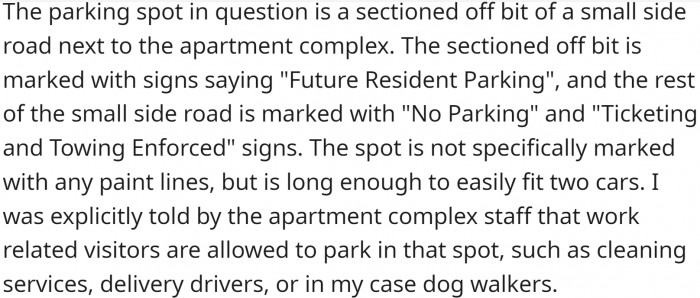
Parking disputes can provoke significant stress, as seen in a study from the University of California, Berkeley, which highlights how minor irritations can escalate into larger conflicts.
This phenomenon relates to the psychological principle of frustration-aggression theory, which posits that blocked goals can lead to aggressive reactions.
In the case of the dog walker, feelings of helplessness regarding parking could contribute to job dissatisfaction, illustrating how environmental stressors impact mental well-being.
Finding Collaborative Solutions
Research in conflict resolution highlights the importance of community-based approaches. A study from Harvard Law School shows that collaborative problem-solving can create win-win situations.
For the dog walker, suggesting a community meeting to discuss parking concerns may foster a sense of shared responsibility.
Establishing guidelines for parking that accommodate residents and service providers can lead to improved relationships and smoother operations in the busy downtown area.
Understanding Frustration in Work Environments
This situation highlights the frustration that can arise when external factors disrupt work efficiency.
According to Dr. Dan Gilbert, a prominent happiness researcher, "External stressors can create significant barriers to our productivity and overall job satisfaction." He emphasizes that when individuals perceive their work environment as obstructive, it can lead to heightened stress levels and diminished performance. This sentiment is echoed by Dr. Tara Brach, a well-known psychologist, who states, "When faced with interruptions and challenges, our ability to focus and engage in our work can be severely impacted, leading to a cycle of stress and reduced effectiveness."
The car in question is a black Ford Mustang with a handicap sign
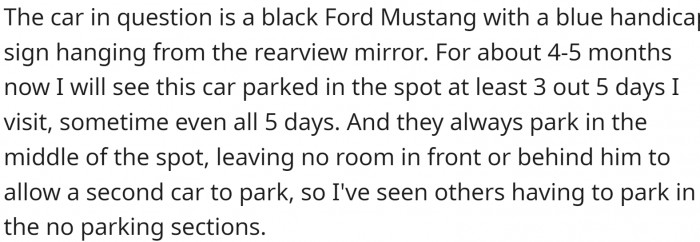
The car is parked in the spot at least three out of five days OP visits, and it bothers them.
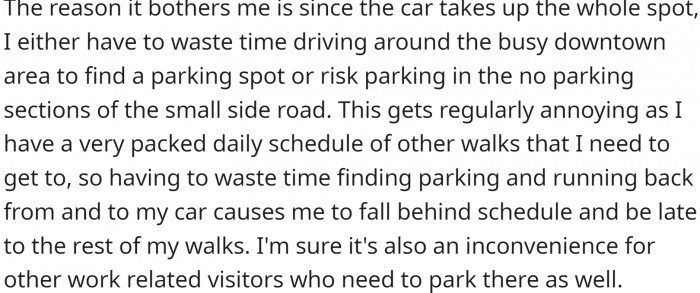
This causes OP to waste time driving around the busy downtown area to find a parking spot or risk parking in the no-parking sections, thus making them fall behind schedule for the rest of their walks.

Understanding Psychological Responses
According to Dr. Jonathan Haidt, a social psychologist, "People often react with anger or resentment when they perceive unfairness, especially in crowded environments." This sentiment is particularly relevant in urban settings where parking is limited. The dog walker’s frustration can be understood through the lens of social justice, as Dr. Haidt emphasizes that "inequitable access to resources can lead to emotional unrest." Recognizing this dynamic can help cultivate empathy and encourage constructive conversations.
Research in organizational psychology suggests that individuals experiencing work-related stress often feel a lack of control over their environment.
This feeling of helplessness can exacerbate frustration and lead to negative emotional responses.
Addressing these feelings through constructive communication can be pivotal in mitigating stress.
So, OP asks if they should complain about the car.

OP has offered the following explanation for why they think they might be the a-hole:

It's one spot.
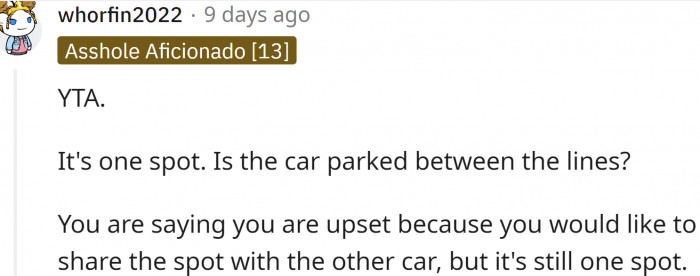
Behavioral psychologists suggest that framing communication positively can lead to better conflict resolution. Research shows that non-confrontational approaches often yield more favorable outcomes.
For instance, using 'I' statements to express feelings about parking issues, such as, 'I feel stressed when I can't find parking,' can reduce defensiveness from others.
Implementing this technique can not only alleviate personal stress but also create a more collaborative atmosphere in addressing the problem.
The Importance of Empathy in Conflict Resolution
Empathy plays a critical role in resolving interpersonal conflicts, especially in demanding work environments.
Studies indicate that when individuals take the time to understand each other's perspectives, conflicts can be resolved more amicably.
Practicing empathy not only helps in understanding the feelings of others but also fosters a collaborative work environment.
The car there has a handicap placard.

Good questions:
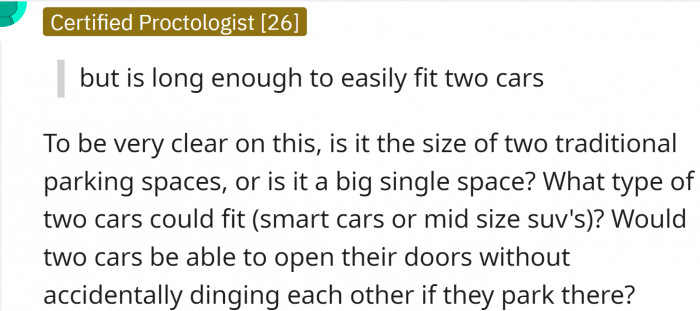
"They have a handicap tag. If anyone, they get first choice on convenient parking."
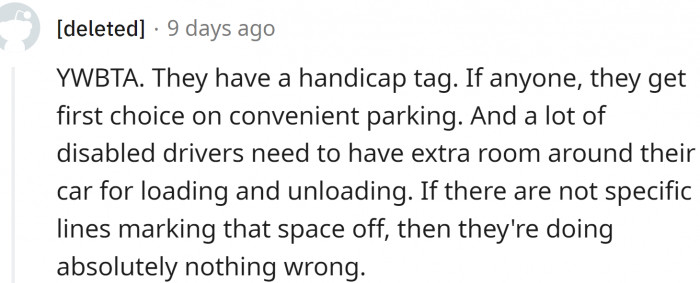
The Role of Empathy in Conflict
Studies show that empathy plays a crucial role in resolving interpersonal conflicts. A report from Stanford University emphasizes that understanding the perspectives of others can significantly decrease animosity.
In this situation, recognizing that the handicapped car owner may have genuine difficulties could allow the dog walker to approach the issue with compassion.
Research indicates that empathetic communication can lead to more cooperative solutions, benefiting both parties involved.
To address workplace frustrations effectively, it’s beneficial to engage in proactive communication strategies.
By openly discussing concerns and potential solutions, individuals can create a more supportive work culture.
Therapists often advise using a problem-solving approach to tackle workplace issues collaboratively.
Not your apt - no right to complain

"It's a large SINGLE space. NOT two separate spaces."

The bottom line is:

Urban living often leads to increased competition for resources, including parking. Research from the University of Michigan confirms that such competition can heighten stress levels.
For the dog walker, creating a flexible schedule or exploring alternative parking options may alleviate some of this pressure.
Behavioral strategies, such as deep breathing or mindfulness before approaching the situation, can also reduce anxiety and improve clarity in communication.
Yes, people can sometimes go overboard in a fight for a parking space. However, it is important to remember that it is only a parking space, and it is not worth getting involved in an altercation.
The car in question has a handicap sign and should be tolerated. OP should definitely lighten up.
If the building management tolerates the car, we can't really understand why OP feels they should do something about it.
Psychological Analysis
This case exemplifies the stress that can arise from external disruptions in work settings.
Encouraging open communication and empathy can help individuals navigate frustrations and create a more harmonious work environment.
Analysis generated by AI
Analysis & Alternative Approaches
This situation illustrates the importance of addressing external factors that can impact work efficiency and relationships.
Research consistently shows that fostering an empathetic work environment can significantly enhance job satisfaction and performance.
By encouraging open communication and understanding, workplaces can mitigate frustrations and enhance team dynamics.
Addressing conflicts, like parking disputes, requires a nuanced understanding of human behavior and emotions. Research emphasizes that effective communication, empathy, and collaboration are vital for resolution.
By adopting strategies grounded in psychological principles, individuals can navigate these challenges more effectively, leading to improved well-being and community relations.
Ultimately, fostering a supportive environment where all parties feel heard can transform conflicts into opportunities for growth and understanding.



